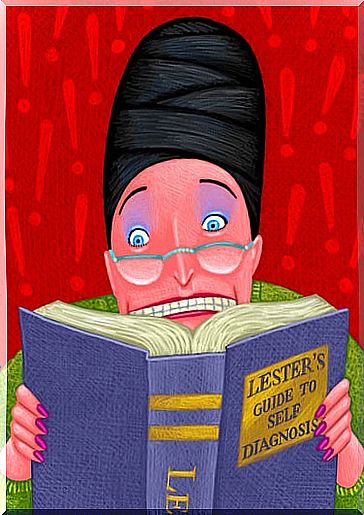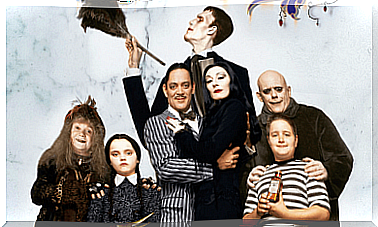8 Signs That Indicate If You Are A Hypochondriac Person

Simply put, hypochondria is the fear or belief of suffering from a serious illness based on a personal and mistaken interpretation of bodily sensations or symptoms. A hypochondriac person thinks they have an illness when they interpret the symptoms.
However, we all feared the possibility of getting sick or we all thought of the worst while waiting for the results of a medical examination in the hospital. So what would be the signs that would determine whether or not we are a hypochondriac person? Here are 8 signs that will confirm if, indeed, you are hypochondriac:
1. You have an inordinate fear of pain or death
Hypochondria is associated with feeling an exaggerated fear of suffering or dying and, in some cases, a fear of one’s own weakness or dependence on others.

However, fear is precisely what makes you look for signs of what you fear in order to find a solution as quickly as possible. Thus, if the slightest sign appears, the anxiety ends up generating anxiety and accentuating the pain / symptom.
2. A small symptom makes you think of the worst
This symptom that you have detected does not go unnoticed. You don’t consider the possibility that this is something neutral or temporary: you are thinking directly of cancer or some other serious illness. For a person with hypochondriac, the headache could be due to a brain tumor and the abdominal pain is never due to gas but rather colic, or worse.
3. You have often thought that you were suffering from a fatal disease
This headache is not occasional. If you are a hypochondriac person, surely you have chronic worry about possible diseases that are developing in your body ; Rejecting some of them will unfortunately not prevent you from being alarmed the next time you notice a discomfort. From a medical point of view, there is a stipulated period of six months after which the disease can be diagnosed.
4. You often see the doctor
The idea may terrify you, but the only way you can find to rule out these potential illnesses is to go to the doctor and, in case of great anxiety, to the emergency room. So you go to the doctor more often than your own mother’s, and in the best-case scenario, if you haven’t been able to put an end to his patience, he will invite you over to his home for Christmas.
5. The doctor is wrong and you are not
Your doctor is sympathetic to you, but you are wary of his medical degree if, when you leave his office, the damn pain returns. It doesn’t matter what tests or questioning your doctor submits to you, after which he assures (swears and perjury) that you are not suffering from the disease you feared so much. But no: you are right and he is wrong.

6. You carry out self-explorations at the slightest opportunity
If Western medicine is unable to corroborate the evidence for your condition, you will try it yourself by doing some careful exploration or researching your ailments on the Internet. You can take your blood pressure, temperature, pulse; consult thousands of pages, read books… which will only make you more distressed.
In some cases, you may develop obsessive-compulsive rituals or behaviors designed to protect yourself from possible infections, such as washing your hands repeatedly, avoiding sharing glasses or cutlery with other people, or excessive hygiene. .
7. Your family and friends no longer believe you when you tell them you are sick.
You don’t understand it, but your family and friends have stopped believing that you really have the illnesses you say you have. You feel misunderstood since you are not inventing anything.
In particular, it bothers you that they say that you are exaggerating, or that “you are telling stories” when you are really suffering from the ailments you are exhibiting. “You’ll see when I’m dead!” “, Do you want to tell them, in another version of” rather die than cheat on me “.
8. You may think you have any disease except hypochondria.
The great contradiction of the hypochondriac is that he can be convinced that he is developing any type of disease but he will always deny having the one from which he really suffers: hypochondria.
Some keys to overcoming hypochondria
If you recognize yourself in most of these statements and if your life is affected emotionally, socially and / or professionally by these types of worries, it is possible that you are hypochondriac. If so, you will be interested in knowing the treatments that are normally applied in people with this psychological disorder so that they stop panicking and are no longer afraid of the disease:
- Prohibition to go to the doctor and also to talk about diseases (or health)
- Exposure technique: accept physical sensations and not fight them
- Desensitization work in the face of illness and death
- Increase self-esteem and live in the present
In addition, to deal with the panic of getting sick in a certain situation, we advise you to:
-
- Recognize that the bodily sensations you experience when you are overwhelmed are just common reactions to stress in its most severe form. In these cases, don’t get carried away by catastrophic thoughts.
- Eliminate intrusive thoughts about what is going on. The more importance you give them, the more panic you will feel. Remember, these are emotions you can control.
- Observe your body in the “here and now” and remove from your mind any thoughts containing what you fear will happen. Instead, focus and repeat “here and now I’m fine”.
- Give the fear time to go away. Do not fight her or force her to leave immediately. Breathe, wait and let it gradually go away. Remember, the idea is to learn to face fear without avoiding it: therefore, every crisis represents an opportunity to progress.
- Check that when you stop thinking about scary facts, the fear subsides and goes away on its own.
- When you start to feel a little better, take a look around and plan what to do next. You can call someone to talk about it, take a walk, have ice cream, etc.
- When you return to what you were doing, come to your senses in a relaxed manner. Be aware of the obstacle you have just passed. Congratulate yourself for it. Then calmly identify and think about what has helped you the most so you can use it next time.
Lastly, remember that sickness anxiety acts like a plant that grows as you talk about it, so be strong and don’t water it! Everything you deny submits to you, and what you accept transforms you …









